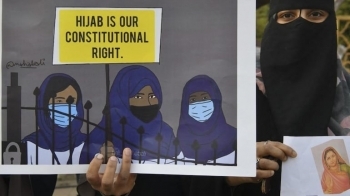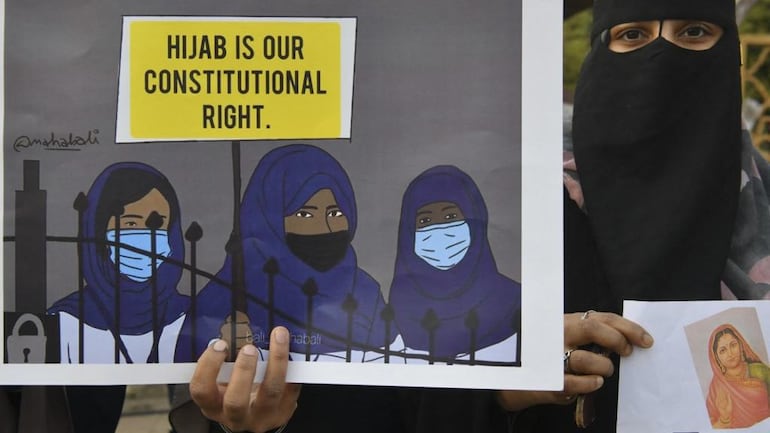
.png) M L Satyan
M L Satyan

Scenario till November 2021: In Karnataka, schools and colleges functioned normally. Students belonging to various religions participated in all academic and extra-curricular activities. Of course, Muslim girls were coming to classrooms with their hijabs. No one had any objection and there was no unrest among students.
A social activist interviewed three girl students -- Fathima, Mary and Lakshmi (names changed). They said, “We live in the same locality. We always celebrate Ramzan, Diwali and Christmas together. In the college we share our food during lunch break. We do our home-work together. Suddenly we are now separated.”
What happened: All of a sudden, in December 2021, Rudra Gowda, Principal of Bhandarkar’s College in Udupi issued a circular, banning Muslim girl students from wearing hijabs in classrooms. Defending his order, Gowda said, "Students are free to wear hijabs inside college premises but not in classrooms. This rule is being followed to ensure uniformity in classrooms." This decision led to an uproar, with some students not being allowed to enter classrooms by college staff and fellow students.
Similarly, students were stopped from attending college for wearing head-scarves. While the college authorities stated that they could not enter premises, students cited the college rulebook which allowed students to wear head-scarves if the colour matches that of uniform. Escalating the matter, students from the Hindu community started wearing saffron scarves to college in protest against the hijab-wearing Muslim students.
Since the first such incident was reported from Udupi on December 28, 2021, five education institutes – three government-run colleges and two private institutes – have denied entry to girl students wearing hijab. Last week police force was deployed for the first time at one of the institutions to prevent any untoward incident.
Students at Bhandarkar’s College said that on 1st February officials of the college called a meeting of all Muslim students. The principal and other lecturers said, “Come to college without wearing hijab. If anyone has objections, they should bring their parents.” When they came with their parents, local MLA Haladi Srinivas Shetty and others were present and no proper answers were given to students and parents.
The second incident was reported from Byndoor government pre-university college, where 12 female students wearing the hijab and 150 Hindu male students wearing saffron shawls were barred from entering classrooms. College authorities insisted that they wear proper uniform, and asked the students to remove their hijab and shawls before entering classes.
The third incident was reported from B.B. Hegde College in Kundapur. This college had earlier allowed students wearing hijab and shawls to attend classes. But suddenly did not allow entry to either group.
The protests by Muslim students and their parents are spreading across the state. On 8th February, Muskan, a Muslim girl, entered her college with hijab. She was surrounded by hundreds of men (hired from outside!) wearing saffron turbans, waving saffron scarves and shouted “Jai Shri Ram”. The girl faced them courageously and started shouting “Allahu Akbar”. A Muslim organization has offered her a prize of Rs 5 lakh for her courage.
Another college in Udupi made the Muslim girls with hijabs to sit in a separate classroom. As per the public, this was another form of “untouchability”.
Meanwhile, the Karnataka High Court, hearing a case filed by five students, said it would stand by the Constitution and not emotions. The High Court will constitute a separate Bench to discuss this matter.
Varied Responses: Malala Yousafzai, the Nobel laureate, said, “Refusing to let girls go to school in their hijabs is horrifying. Indian leaders must stop the marginalisation of Muslim women.”
The women and activists say that the action is a violation of their constitutional rights but the government and the authorities say that rules prevent any display of religious symbols in educational institutions. Some Hindu groups, who are opposed to Muslim women wearing the hijab in the classroom, have also mobilised local students to wear saffron scarves to institutions.
Amid the furore, the Karnataka government has asked educational institutions to follow the existing uniform-related rules until the High Court comes out with an order in this regard. The Government has also ordered the closure of all high schools and colleges for three days.
Former J&K Chief Minister and People’s Democratic Party (PDP) president Mehbooba Mufti has condemned the college’s move and said it was an attempt to legitimising the marginalisation of Muslims. She said, "The government cannot thrust its decision on different religions as every religion has its own teachings. Nobody can be forced to refrain from following religious obligations". Further she said, “There is an attempt to impose one language, one dress, which is not possible. ‘Beti Bachao, Beti Padhao’ (save daughter and educate daughter) is yet another hollow slogan. Muslim girls are being denied the right to education simply because of their attire. Legitimising the marginalisation of Muslims is one more step towards converting Gandhi’s India into Godse’s India."
Commenting on the ongoing hijab row, Congress leader Rahul Gandhi said: "By letting students' hijab come in the way of their education, we are robbing the future of the daughters of India. Ma Saraswati gives knowledge to all. She does not differentiate."
Congress leader and former Karnataka Chief Minister Siddaramaiah also tweeted on the issue, stating that prohibiting the entry of those wearing hijab was a "violation of fundamental rights." Karnataka Congress MLA Kaneez Fathima led a protest in Kalburgi, demanding that girls with hijab should be allowed on the campus.
As the hijab row in Karnataka escalated, the issue was raised by several Lok Sabha MPs slamming the BJP-ruled Karnataka government. MPs like Dr. S. Senthilkumar, Imtiaz Jaleel and Shashi Tharoor questioned the government colleges’ move, raising freedom of religion and stopping girl students from attending exams and classes. Tharoor said, "This kind of policy is wrong. We have Sikhs who wear turbans, Christians have their crucifix around their neck, Hindus who sometimes come with 'Tilak' and all of this is normal."
Political Agenda: It has become clear that the RSS-driven BJP government at the Centre as well as in the states are executing their agenda of “creating communal violence” in the name of religion. A small spark of fire has now started spreading like wild fire not only in Karnataka but also in other states.
During last December there were “planned attacks” by Hindu fundamentalist groups to disturb Christmas celebrations in various parts of the country. In Tamil Nadu, a Christian school student’s suicide was turned into an issue of “forced conversion” by BJP. The hostel warden nun who was in jail has been granted bail. A statue of St. Sebastian in a Church in Coimbatore was broken by none other than some Hindu fundamentalist youth.
On the one side, Modi-Shah and their colleagues are busy with election campaigns by repeating their pet slogan “Beti Bachao, Beti Padhao”. On the other side, the same group is seemingly encouraging communal violence and spreading the slogan “Beti Darao, Beti Dhamkao”. What an irony!
(The writer is a freelance journalist and an NGO Consultant. Contact at mlsatyan55@gmail.com)